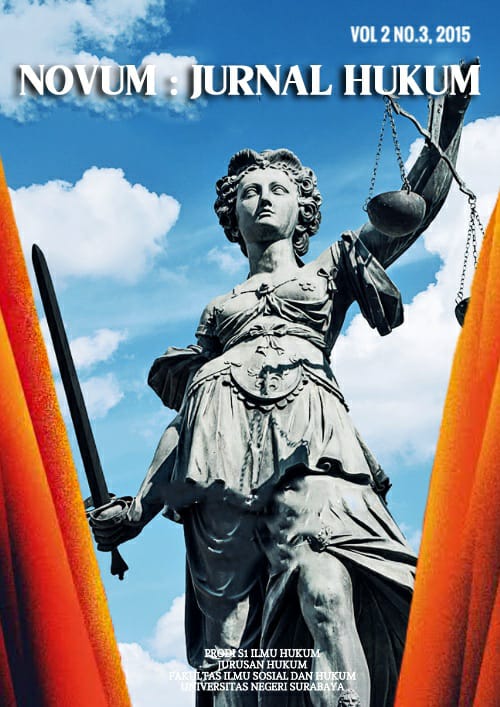ANALISIS YURIDIS PUTUSAN MAHKAMAH KONSTITUSI NOMOR 49/PUU-VIII/2010 TENTANG MASA JABATAN JAKSA AGUNG
DOI:
https://doi.org/10.2674/novum.v2i3.14772Abstract
Kontroversi pemberhentian Jaksa Agung Hendarman Supandji bermula ketika Jaksa Agung menetapkan Yusril Ihza Mahendra sebagai tersangka kasus dugaan korupsi biaya akses sistem administrasi badan hukum (sisminbakum). Yusril Ihza Mahendra selaku tersangka mengajukan permohonan uji materi kepada Mahkamah Konstitusi terhadap pasal 22 ayat (1) huruf d Undang-Undang Nomor 16 Tahun 2004 Tentang Kejaksaan RI. Menurutnya, pasal tersebut tidak memberikan kepastian hukum atas jabatan Jaksa Agung, sehingga dengan berlakunya pasal tersebut Yusril Ihza Mahendra dirugikan hak konstitusionalnya. Tujuan penelitian ini yaitu untuk mengkaji dasar pertimbangan hakim Mahkamah Konstitusi serta akibat hukum dari putusan Mahkamah Konstitusi nomor 49/PUU-VIII/2010. Penelitian ini merupakan jenis penelitian hukum normatif. Pendekatan penelitian yang digunakan adalah pendekatan perundang-undangan, pendekatan konseptual, pendekatan kasus, pendekatan historis, dan pendekatan perbandingan. Berdasarkan hasil penelitian yang telah diperoleh, dapat disimpulkan bahwa Mahkamah Konstitusi dalam putusan ini telah membentuk norma baru melalui putusan berjenis konstitusional bersyarat, dengan berdasarkan ratio decidendi sejarah kedudukan Kejaksaan dan konvensi ketatanegaraan yang mengatur masa jabatan Jaksa agung. Putusan ini ternyata tidak membawa akibat hukum terhadap kasus sisminbakum yang dihadapi Yusril Ihza Mahendra dan juga tidak dapat memberhentikan Hendarman Supandji sebagai Jaksa Agung sebab putusan Mahkamah Konstitusi tidak dapat berlaku surut. Keberlakuan putusan Mahkamah Konstitusi Nomor 49/PUU-VIII/2010 baru berlaku untuk Pengangkatan Jaksa Agung selanjutnya.
Kata Kunci: ratio decidendi, Jaksa Agung, konstitusional bersyarat, akibat hukum.
ABSTRACT
The termination controversy of General Attorney Hendarman Supandji began when the he accused Yusril Ihza Mahendra as corruption suspect for access fee in legal entity administration system (Sisminbakum). Yusril Ihza Mahendra as a suspect, requested a Judicial Review to Constitutional Court against article 22 verse (1) letter d of Law Number 16 Year 2004 Concerning Indonesian Attorney. According to him, the article does not provide law certainty to General Attorney position, as the result, Yusril Ihza Mahendra constitutional rights is lost. The purpose of this research is for assess the basis considerations of the judge Constitutional Court and the legal consequences Constitutional Court decision Number 49/PUU-VIII/2010. This study is a normative legal research. The research approach used in this research are statute, conceptual, case, and historical approach. Based on the research results, it can be concluded that the Court decision has established a new norm through various conditional constitutional decision, and based upon the ratio decidendi about history of Attorney Office and constitutional conventions governing tenure of General Attorney. This decision did not bring legal consequences for the Sisminbakum case faced by Yusril Ihza Mahendra and also cannot lay off Hendarman Supandji as General Attorney because of the Constitutional Court decision can not be applied retroactively. The enforceability of the Constitutional Court decision Number 49/PUU-VIII/2010 can be applied for the next appointment of the General Attorney.
Keywords: ratio decidendi, General Attorney, conditional constitutional, legal consequences
Downloads
 Abstract views: 343
,
Abstract views: 343
, PDF Downloads: 225
PDF Downloads: 225



